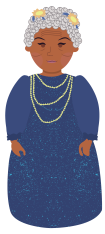 Our woman hero of September is Fanny Cochrane Smith! She was an Aboriginal Tasmanian, born in December 1834. She is considered to be the last fluent speaker of a Tasmanian language, and her wax cylinder recordings of songs are the only audio recordings of any of Tasmania’s indigenous languages. Her recordings were inducted into the UNESCO Australian Memory of the World Register in 2017.
Our woman hero of September is Fanny Cochrane Smith! She was an Aboriginal Tasmanian, born in December 1834. She is considered to be the last fluent speaker of a Tasmanian language, and her wax cylinder recordings of songs are the only audio recordings of any of Tasmania’s indigenous languages. Her recordings were inducted into the UNESCO Australian Memory of the World Register in 2017.
Fanny was born in December 1834 at Settlement Point (or Wybalenna, meaning Black Man’s House) on Flinders Island. No indigenous name is known; Rev. George Augustus Robinson, who was the Chief Protector of Aborigines in Port Phillip District (now Victoria, Australia), from 1839 to 1849, gave European names to all the Indigenous Tasmanians who arrived at the Island as part of his attempt to suppress their culture.
 Proud of her Aboriginal identity, Fanny also moved with confidence in the European world. She and her husband, William Smith, were early converts to Methodism in their area and one of their sons became a lay preacher. Church services were held in Fanny’s kitchen until a church was built on land which she donated. She was active in fund-raising and hosted the annual Methodist picnic, people travelling long distances to sample her cooking and to see her perform Aboriginal songs and dances.
Proud of her Aboriginal identity, Fanny also moved with confidence in the European world. She and her husband, William Smith, were early converts to Methodism in their area and one of their sons became a lay preacher. Church services were held in Fanny’s kitchen until a church was built on land which she donated. She was active in fund-raising and hosted the annual Methodist picnic, people travelling long distances to sample her cooking and to see her perform Aboriginal songs and dances.
Following the death of Truganini in 1876, Fanny laid claim to be “the last Tasmanian”. The government of the Colony of Tasmania recognized this claim in 1889 and granted her 300 acres (120 ha) of land and increased her annuity to £50. Fanny died of pneumonia and pleurisy at Port Cygnet, 10 mi (16 km) from Oyster Cove, on 24 February 1905.
 Fanny is known for her wax cylinder recordings of Aboriginal songs, made in 1903, which comprise the only audio recordings of an indigenous Tasmanian language. Five cylinders were cut, however by 1949 only four remained as “A fifth cylinder, on which was recorded the translation of the songs, was broken some time ago”. Upon hearing her own performance, Fanny had cried “My poor race. What have I done”, she believed the voice to be that of her mother.
Fanny is known for her wax cylinder recordings of Aboriginal songs, made in 1903, which comprise the only audio recordings of an indigenous Tasmanian language. Five cylinders were cut, however by 1949 only four remained as “A fifth cylinder, on which was recorded the translation of the songs, was broken some time ago”. Upon hearing her own performance, Fanny had cried “My poor race. What have I done”, she believed the voice to be that of her mother.
The recording of Fanny’s songs was the subject of a 1998 song by Australian folk singer Bruce Watson, The Man and the Woman and the Edison Phonograph. Watson is the great grandson of Horace Watson, who recorded Fanny in 1903. A photograph of Fanny Cochrane Smith and Horace Watson is displayed in the collection of the National Museum of Australia.

Fanny Cochrane Smith inspires us that wherever we are, we must be proud of who we are and where we came from. And we must protect our culture, or it will someday disappear.
Need other kinds of inspiration? Just check Adorageek’s other posts!
Hero of February: Sarojini Naidu
Hero of April: Gabriela Mistral


3 thoughts on “Hero of September: Fanny Cochrane Smith”